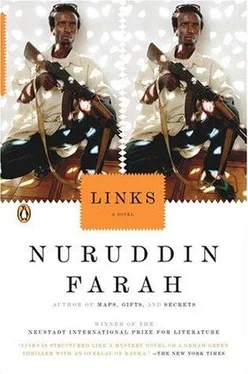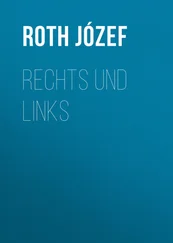“The son takes his father back to the hamlet, and the chains of curses, guilt, and more sorrows are thus broken.”
Then Faahiye was gone!
AFTER DAJAAL PICKED HIM UP OUTSIDE THE RESTAURANT, JEEBLEH judiciously related some of what had transpired since he left Bile’s apartment. He withheld the part about his visit to the cemetery with Af-Laawe, his musclemen, and the supposed housekeeper. Then he asked Dajaal’s interpretation of the folktale.
“I would assume that he is now prepared to return to the fold of the family.” Dajaal clutched the machine gun lying in his lap. After a silence, he added, “I doubt that it’ll be a let-bygones-be-bygones return, though. He’ll lay down his conditions, that’s for sure.”
“Why do you say that?”
“I have the feeling that he is being blackmailed. But however you look at it, it’s definitely a relief that he is ready to break the cycle of curses and to reconcile himself to his new situation.”
Jeebleh said, “He’s from the old world, all right!”
Dajaal drove without talking, visibly hampered by the gun on his lap, which slipped whenever he took a bend. They were headed back to Bile’s, and were less than a kilometer away when Jeebleh asked if Dajaal could do him a favor.
Dajaal slowed the car. “Y-e-s!”
“Could you take me to the cemetery, please?”
“Why?”
“I wish to visit my mother’s grave, to pay my belated respects to her, to say a brief prayer in peace there. I’ll be in your debt forever if you get me there and back.”
“How do we find the grave?”
Jeebleh explained that Shanta had given him directions, and that he knew what to look for.
“We’ll have to let Bile know.”
“I don’t think that’s necessary,” Jeebleh said.
Dajaal gave this a moment’s thought, and then deferred to Jeebleh’s decision. Even so, he fidgeted as he drove. The gun kept slipping off his lap, and he kept grabbing it with his left hand just before it dropped to the floor.
“Since I am playing truant today, I might as well hold the gun,” Jeebleh offered. “At least that’ll make your driving easier.”
Dajaal had yet to come up with an answer when Jeebleh took hold of the weapon, turning it this way and that. Admiring it. He surprised even himself when he said, “This is a beauty, isn’t it?”
“It’s well put together, I agree.” Then a rider: “Mind you, go gentle, okay?” Dajaal might have been warning a toddler about the dangers of fire.
This was the first time in his life that Jeebleh had held a firearm. What worried him was his spellbound, facile adoration of the gun. The muscleman had injected him with a potion that had altered his nature and personality, and soon he might no longer challenge a statement like the one spoken by Af-Laawe on the day of his arrival: that guns lack the body of human truths! As he fondled the gun, he realized that he was a changed man, different from the one who had left a loving wife and two daughters back home, promising to be cautious, and to bring back the life, his, of which he was a mere custodian.
They arrived at the broken signboard that marked the entrance to the General Cemetery, and drove around in search of the landmarks Shanta had told Jeebleh about. He was sweating with worry when they passed the section where Af-Laawe had taken him; he remembered what had been done to him, and how rude Af-Laawe had been. But he chose not to speak of any of this to Dajaal. He was relieved as the uncut wild shrubs impeded their progress, and they had to take a long, roundabout way toward a large mango tree.
Jeebleh apologized for making Dajaal go through all this. “If my mother had not departed the way she did,” he said, “with her soul bothered and her peace troubled, I should not have insisted on your bringing me here now.”
As soon as he discovered a straight path to the mango tree, Dajaal revved the engine. He parked the car under an acacia, and stayed there, covering Jeebleh with the machine gun — they could not be sure, Af-Laawe or his cronies might be lying in wait. Jeebleh got out of the car without fear and, no longer tired, strode forward with a fresh spring. Now that he had found the spot marked with four medium-to-large stones bearing his mother’s name, Waliya, he looked around and saw how close he had been to it on his previous visit. He doubted that the purported housekeeper knew where the grave was; Af-Laawe, however, did. From where he stood, Jeebleh could see that here too the earth had shifted, and several mounds had collapsed on themselves.
He sank to his knees, humbling himself in prayerful memory of a mother whom he felt he had failed. In this crouched posture, he resembled a haunted creature from prehistory deferring to a sky god. His eyes opened wide onto an endless day of prayer, and an eternal night of commiseration.
He was now more at peace with himself than at any time since his arrival in the city of ruin. And when Dajaal came to him, suggesting that it was time to leave, Jeebleh requested that they call at Bile’s mother’s grave. Again, he crouched in supplication, the boundary marked with a fruitless lemon tree which offered hardly any shadow, and four medium-to-large stones bearing the name: Hagarr.
AT THE APARTMENT, HE TOLD BILE AND SEAMUS MORE THAN HE HAD BEEN prepared to share with Dajaal, about what had been done to him and how he had suffered at Af-Laawe’s hand. Then he explained what he had done, and how, soon after calling at the graves of his mother and that of Auntie Hagarr, peace had returned to him.
When Shanta, who was in a party mood, joined them, Jeebleh purged his story of the mention of the jab he had been given by Af-Laawe’s muscleman. Nor did he bother to inform her of his thought that the muscleman was a doctor on retainer to the cartel. Yet Jeebleh harbored his own worries. His hand kept returning to the spot where he’d been jabbed, and he wondered whether it would grow larger than a boil before the night was out. Earlier, he had shown it to Bile, who promised that they would go for tests at the city’s only lab with a pathology facility, rudimentary as it was. Jeebleh’s mind kept returning to the many occasions in their youth when Caloosha had subjected him and Bile to torture; he knew that he had come to a point in his life when he should face his demons, and in some way deal with them. To take his mind off his worries, he emphasized Dajaal’s opinion that Faahiye was a victim of blackmail. When she heard that Jeebleh had called at their mothers’ graves, Shanta became more boisterous, kissing, ululating, a woman in celebration.
The four stayed up most of the night, talking, engaging in conjecture. No one wanted to break up the improvised gathering, and of course, Shanta had no wish to go back to an empty, desolate home; she preferred instead to sleep on the living room floor. Whereas Shanta, in her nervous optimism, felt that Raasta and Makka’s return was imminent, the others were not of that view, especially Bile. All the same, the apartment was charged with Shanta’s renewed energy. They tried to imagine their way into Faahiye’s mind, speculating over the same ground: Why did he keep telling Jeebleh that he wasn’t at liberty to disclose this or that bit of information? How was Raasta bearing up, and what was her mental state? Was Faahiye telling the truth when he said that he had been at the refugee camp in Mombasa? With Shanta’s spirits so high, the three men were careful not to say or do anything that might spoil her flowering enthusiasm.
For fear of being thought a party-pooper, Bile acquiesced to Shanta’s demand that the generator run for much longer than was customary. All sorts of drinks came out of the cabinet, soft, hard, and in between. Seamus helped himself to several bottles of beer and as many generous tots of whiskey as his tumbler could contain. A wine bottle of excellent Italian vintage, bought in Rome, was uncorked. Coffee was made, and tea brewed. Glasses that hadn’t been dusted for years, since no one could think of a good enough reason to celebrate, were passed around. Shanta insisted on a very sweet orange drink.
Читать дальше












